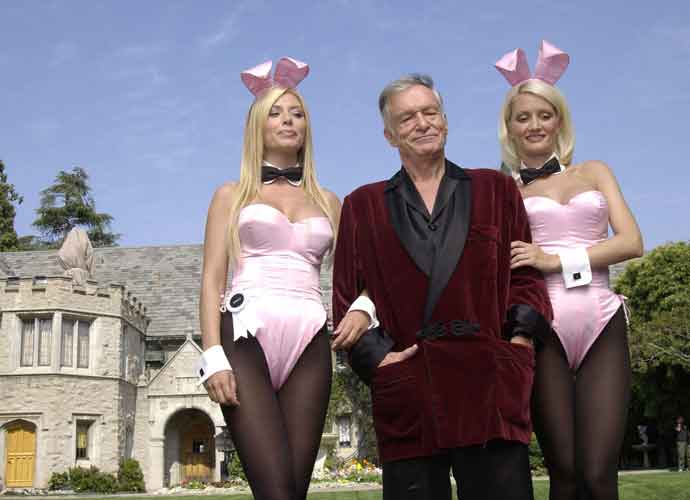Hugh Hefner, ‘Playboy’ Founder, Dies At 91
Hugh Hefner, the mastermind behind media giant Playboy, has died at 91.
HUGH HEFNER DIES AT 91
Hefner died on Wednesday at his home, the Playboy Mansion near Beverly Hills. Playboy Enterprises announced the loss, citing natural causes. “Hugh M. Hefner, the American icon who in 1953 introduced the world to Playboy magazine and built the company into one of the most recognizable American global brands in history, peacefully passed away today from natural causes at his home, The Playboy Mansion, surrounded by loved ones,” read the statement.
American Icon and Playboy Founder, Hugh M. Hefner passed away today. He was 91. #RIPHef pic.twitter.com/tCLa2iNXa4
— Playboy (@Playboy) September 28, 2017
Often photographed wearing his iconic silk pajamas and smoking jacket, Hef, as he was lovingly called, founded Playboy in 1953. It was an attempt to provide an outlet for the sexes to understand each other, and wanted sexuality to be more accepted in American culture. “Esquire was always for older guys, but … it was very much devoted to male bonding and outdoor adventure,” Hefner told CNN. “And I wanted to read a magazine that was a little more sophisticated and was focused really on the romantic connection between the sexes from a male point of view.”
Hef was 27-years-old at the time, a new father, and married to who he claimed was the first woman he slept with. Later in life he admitted to sleeping with “over a thousand” women. “There were chunks of my life when I was married, and when I was married I never cheated. But I made up for it when I wasn’t married,” he said in a 2013 interview with Esquire.
The debut issue came out in Dec. of that year and featured Marilyn Monroe on the cover, with a naked centerfold of the actress as well. In the essay introducing readers to the material, he said, “We enjoy mixing up cocktails and an hors d’oeuvre or two, putting a little mood music on the phonograph and inviting in a female acquaintance for a quiet discussion on Picasso, Nietzsche, jazz, sex.”
Of course, the issue was a success, selling more than 50,000 copies. Hefner personally selected the monthly “Playmates,” and persuaded known sex symbols to appear nude, including Jayne Mansfield and Ursula Andress.
“I think that women, in the best sense, and not in a negative sense, are objects of desire,” he told Larry King in 2010. “That is a celebration of one’s own sexuality and the fact that we are two sexes. And what Playboy tried to (do) is to elevate it to another kind of level that did celebrate that.”
But Hef also believed that the magazine was about more than sex, and published short stories from the likes of John Updike, Vladimir Nabokov, and James Bond author Ian Fleming, inciting the humorous phrase, “I only read Playboy for the articles.” The magazine also occasionally featured interviews with important figures, such as Martin Luther King Jr., John Lennon, and Muhammad Ali. Hefner was considered a civil rights activist for his work as well, which was chronicled in a 2009 documentary called Hugh Hefner: Playboy, Activist, Rebel.
In the 1960s, Playboy flourished and Hef launched a chain of exclusive clubs with the Playboy name. In 1971, he brought the famed Playboy Mansion into existence, and held lavish parties there, in addition to residing there. 1971 is also when magazine sales peaked, at seven million issues. Much raunchier men’s magazines began and by the ’80s, Playboy had lost much of its readership. And by the 2000s, internet pornography had taken over that.
Hef, however, kept the brand running thanks to his reality series The Girls Next Door, which ran for five years on E! He also kept a weekly schedule of activities and events at the Playboy Mansion. By 2015, Playboy‘s circulation was down to around 800,000. In 2016, the magazine decided to do away with nude woman in the publication all together, but reversed the decision in 2017, citing it as “a mistake.”
“He was very bold,” said USC gender studies professor Lois Banner. “Much of his brilliance is as a marketer. A lot of his brilliance is not necessarily as the creator of a cultural icon, because that cultural icon is women… He simply raised it up to a kind of epic phenomenon in culture.”
In 2016, Hefner sold the Playboy Mansion for $100 million, which was about half his asking price. It was the most expensive home ever sold in Los Angeles, but came with one caveat – that Hef got to live out the remainder of his life in the mansion. Despite Playboy‘s dwindling sales, the company still makes money from licensing its logo on various products. And Hefner holds the Guinness World Record for longest editor-in-chief at the same magazine, holding the post for more than 60 years. The magazine holds a specific spot in American history.
“Love him or loathe him, no one doubts Mr. Hefner’s influence in American cultural history,” The New York Times wrote in 2009. “As a magazine publisher, he essentially did for sex what Ray Kroc did for roadside food: clean it up for a rising middle class.”
Playboy quoted Hefner in 1974, saying, “If you don’t encourage healthy sexual expression in public, you get unhealthy sexual expression in private. If you attempt to suppress sex in books, magazines, movies and even everyday conversation, you aren’t helping to make sex more private, just more hidden. You’re keeping sex in the dark. What we’ve tried to do is turn on the lights.”
RELATED ARTICLES
Get the most-revealing celebrity conversations with the uInterview podcast!








Leave a comment